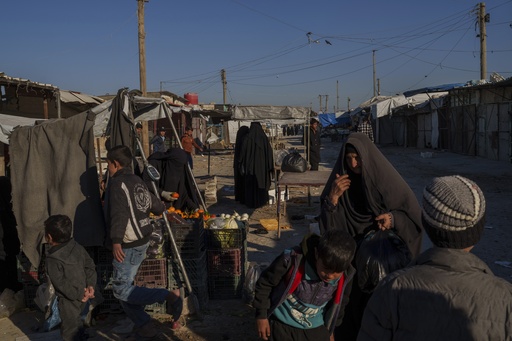AL-HOL, Syria — Ahmad Abdullah Hammoud is fortunate to have a stockpile of food to sustain his family after a U.S.-funded organization abruptly halted its support at the vast al-Hol camp in northeastern Syria, where they have been residing for nearly six years.
His family is part of a group of 37,000 individuals, primarily women and children, connected to the Islamic State group in the dismal, litter-filled environment of al-Hol camp. The suspension of foreign aid during the Trump administration has created turmoil and heightened the already severe humanitarian crisis in the area.
Human rights organizations have long reported on the appalling living conditions and widespread violence within the camp, which predominantly shelters the wives and children of IS militants as well as other supporters of the group.
Following the announcement of the aid freeze shortly after Trump assumed office, many aid programs funded by the U.S. worldwide began ceasing operations, including the organization responsible for many activities at al-Hol, which operates under the U.S.-led coalition aimed at combating IS.
According to the camp’s director, the U.S.-based Blumont temporarily stopped its operations. This organization had been supplying crucial necessities such as bread, water, kerosene, and cooking gas. Blumont did not respond to inquiries.
“We were distressed when Blumont halted its aid,” Hammoud, who claims he has no ties to IS and was displaced in the midst of Syria’s civil war, stated. “Honestly, we struggled to find food. Even bread was only available at 2 p.m.,” remarked another resident, Dirar al-Ali.
Jihan Hanan, the camp director, relayed that other aid organizations, including the World Health Organization, have also limited their operations. She criticized the Trump administration’s decisions, emphasizing that some camp residents have suggested they should be allowed to leave if sufficient food cannot be supplied.
Hanan mentioned that Blumont provided 5,000 bread bags each day, costing approximately $4,000, a financial burden that local Kurdish authorities cannot shoulder.
Looking to the future, Hanan indicated that Blumont received a two-week waiver from the Trump administration, allowing them to recommence operations. However, uncertainty looms over what will occur when the waiver expires.
Mazloum Abdi, the commander of the U.S.-backed Syrian Democratic Forces governing northeastern Syria, noted he has discussed the aid freeze with officials from the U.S.-led coalition.
“We are close to finding an alternative solution regarding this decision,” Abdi conveyed, suggesting that an exemption may be issued concerning northeastern Syria.
Meanwhile, the U.S. aid freeze coincides with a resurgence of IS efforts to exploit the instability following the insurgents’ recent destabilization of Assad’s regime. A further reduction in food supplies could incite riots among residents, which IS sleeper cells might take advantage of.
According to Hanan, the camp has received alerts from the U.S.-led coalition, the Iraqi government, and the Kurdish-led SDF that IS may be planning attacks on the camp in the wake of Assad’s fall. Security measures have been tightened, with Hanan stating that the situation is currently under control.
The SDF oversees 28 detention centers in the region housing around 9,000 IS members. Hanan and an official from the largest detention center in Hassakeh, who spoke on the condition of anonymity, asserted that the U.S. aid suspension is not expected to compromise security at al-Hol camp or the detention facilities.
The main section of al-Hol accommodates around 16,000 Iraqi residents and 15,000 Syrian residents. Another heavily fortified area known as the Annex holds an additional 6,300 detainees from 42 different countries, most of whom are considered the most committed supporters of IS.
Living conditions in the camp are harsh, with no paved roads and mounds of trash. Many children and teenagers occupy their time playing soccer or aimlessly wandering.
In the Annex, some children threw stones at visiting journalists and yelled remarks such as “You are a Satan” and “The Islamic State will endure.”
A woman from China in the Annex, identifying herself as Asmaa Ahmad from Xinjiang, referred to her husband as an “Islamic State martyr,” having been killed in 2019 during the last battles in Baghouz. Ahmad, currently in the camp with her four children, expressed her reluctance to return to China due to fears of persecution. In response to the loss of U.S. aid, she simply stated, “Sustenance is from God,” and expressed hope for IS members to come to their rescue.
Hanan remarked on the perilous nature of al-Hol, urging nations to repatriate their citizens to prevent children from being conditioned to extremist ideologies. “This place is not suitable for children,” she asserted.
For years, the U.S. military has been advocating for countries with citizens in al-Hol and the related Roj Camp to repatriate them.
“If international repatriation, rehabilitation, and reintegration efforts do not take place, these camps risk creating a new generation of ISIS,” emphasized General Michael Erik Kurilla, chief of U.S. Central Command, during a recent visit to the camp.
Hanan mentioned that following Assad’s fall, numerous Syrians in the camp have expressed a willingness to return to areas controlled by the new authorities in Syria. She stated that camp officials have decided to allow any Syrian who wishes to leave to do so.
However, she cautioned that even if the camp’s population decreases, an aid suspension from the U.S. would lead to an impending disaster.



